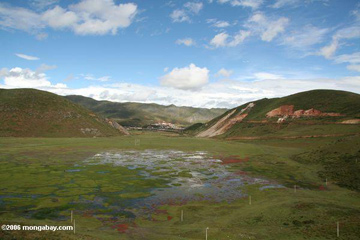China’s wetlands shrinking due to global warming
China’s wetlands shrinking due to global warming
mongabay.com
July 16, 2007
Wetlands on China’s Qinghai-Tibet plateau have shrunk by more than 10 percent over the past 40 years, posing a threat to agriculture and river flows, according to scientists from the Chinese Academy of Sciences. Wetlands at the Yangtze’s origin contracted 29 percent over the same period.
Chinese scientists blamed climate change for the disappearing wetlands.
“The wetland plays a key role in containing water and adjusting the water volume of the rivers,” the China Daily newspaper quoted Wang Xugen, a researcher with the academy, as saying. “The shrinking of the wetlands on the plateau is closely connected with global warming.”
Wang said that “though rainfall in the region was increasing due to climate change, water flows in the rivers had not increased due to faster evaporation caused by the higher temperatures,” according to AFP.

|
The new report comes three months after China said it would spend more than $2.1 billion (16.5 billion yuan) to protect and restore its highly endangered wetlands over the next five years.
Concerns over water resources are nothing new in China. Just last week, state media reported that glaciers in the western province of Xinjiang shrank 20% in 40 years, while snow lines receded by 60 meters (200 feet). Meanwhile the government estimates that roughly 300 cities in China face water shortages while untreated sewage and industrial waste pollute around 70% of China’s rivers.
Pollution was cited as a leading factor behind the probable extinction of the Baiji, the Yangtze’s famous freshwater river dolphin, earlier this year.
Related articles
Damage to Yangtze ‘irreversible’ says China. Pollution, dams and excessive boat traffic have caused an ‘largely irreversible’ decline in the aquatic ecology of the Yangtze says a report issued by China’s official State Environmental Protection Administration (SEPA).
China misses pollution targets. China’s environmental protection agency said that the country failed to meet any of its 2006 pollution control goals according to its web site. The State Environmental Protection (SEPA) admitted that economic growth actually caused the country to fall well behind its environmental targets.
China makes environmental moves as problems mount. China, the world’s most populous country and fastest growing economy, faces a host of environmental problems. Energy and water shortages, water and air pollution, cropland and biodiversity losses, and escalating emissions of greenhouses gases are all concerns as the country moves towards world superpower status. While these issues could threaten to destablilize the country and derail economic growth, it appears that it is taking steps to address some of these challenges.














